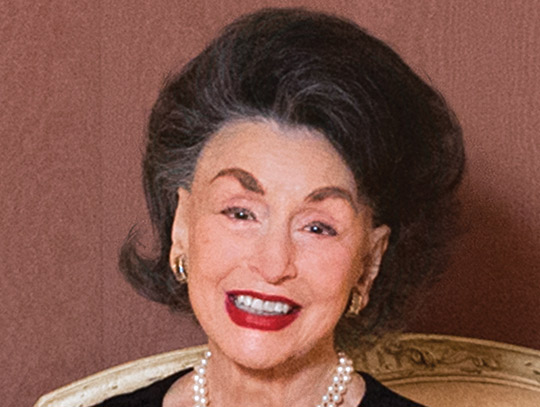Alumni Focus: Doing What Mothers Do
Phyllis L. Kossoff sought help for a daughter with cystic fibrosis, and afflicted families nationwide gained a powerful advocate
Phyllis L. Kossoff collects aphorisms, including one translated from the 17th century Japanese: “Now that my house has burned down, I can see the moon.”
When their newborn daughter Stephanie failed to thrive, Kossoff and her husband Burton learned she was afflicted with cystic fibrosis, a genetic disorder that then killed most children by age five. Stephanie died at 19 as a freshman at Barnard. For Kossoff, the loss can still seem fresh. Yet along the way, her life began again.
“Better to light a candle than to rail against the darkness,” she says, paraphrasing the Chinese proverb. Best known to the TC community for the policy lectures that bear her name, she is a petite, graceful woman who speaks softly and smiles often. “When Stephanie was born, so little was known about CF that there wasn’t a chapter in the textbooks. So we did what parents do. I did what mothers do.”
Kossoff struggled to give Stephanie and her younger brother Mitchell something approaching a normal life even as she tried to protect Stephanie from children with colds and respiratory infections. “It was hard on my son, and he was a supportive and loving brother,” she says of Mitchell, now a practicing New York City attorney.
Working with other parents and supported by Burton, Kossoff also spurred the creation of the national Cystic Fibrosis Foundation. Over the past 50 years, thanks to antibiotics, gene-protein therapy and other advances enabled by the foundation, the median lifespan for those with CF has risen above 40.
Kossoff, whose father died when she was two, credits her mother, the first female sales rep in the paper goods industry, for teaching her that “‘No’ is just the beginning of a conversation.” She herself graduated from Hunter College at 19, earned her TC master’s degree in health and physical education and taught “manners and morals” to East Harlem junior high school girls before focusing on CF. Ten years ago, she turned her attention to higher education, endowing scholarships and lectures at Barnard in her daughter’s name; at Baruch College in her husband’s name (he was an alumnus and trustee); and at Hunter and TC in her own.
“I like programs, not plaques,” says Kossoff, who in 2004 created TC’s Phyllis and Burton Kossoff Scholarship Fund, which so far has supported 10 students in the College’s Department of Human Development. (The current Kossoff Scholar, Kalina Gjicali, is a master’s student in Cognitive Studies & Education.)
Picking program topics at Baruch and Barnard was easy — business leadership for her husband’s lecture and early childhood for her daughter’s scholarship (“children loved her”) — but it was a meeting with faculty member Sharon Lynn Kagan that decided her on a policy focus for TC’s lecture. (Kossoff also maintains a pioneering lecture at Hunter’s Roosevelt House Public Policy Institute.)
“She explained the need to have evidence-based, data-driven research translated into policy that’s mainstreamed into the education system,” Kossoff says. “I thought, that’s where I want to be, because policy comes nearest to a tangible result.”
TC’s Phyllis L. Kossoff Lecture on Education and Policy has included a debate between the two presidential nominees’ education advisers in fall 2012; a major policy address by U.S. Secretary of Education Arne Duncan; a round table featuring New York State Regents Chancellor Merryl Tisch (Ed.D. ’05); and policy addresses by two New York City public school chancellors — Dennis Walcott in 2011 and former TC Cahn Fellow board member Carmen Fariña this spring.
“I’m honored that the Kossoff Lecture is credited with helping to establish TC as the nation’s premier address for the national conversation on education,” she says.
Kossoff sometimes becomes upset when people compliment her for her cystic fibrosis advocacy.
“If there’s a legacy, it’s my daughter’s legacy,” she says.
Still, she was touched when a former student graduating from college wrote to thank her.
“She said she knew how much I cared and how much her success would mean to me.” Kossoff smiles. “A note like that is pretty special.”
— Joe Levine
Published Friday, May. 30, 2014
